
Dynamic Tool uses its two Kitamura Bridgecenter 6G#40 machining centers to fabricate these highly customized mold bases. The B-plate shown above is part of a production mold that produces filtering components for a medical device. Tooling techniques like cam actions, slides, lifters, auto-unscrew, in-mold closing or core toggle require sophisticated A- and B-plates manufactured accurately, efficiently and repeatedly. Source (All Images) | Dynamic Tool Corp.
Founded in 1976, Dynamic Tool Corp. (originally Dynamic Tool & Design) of Menomonee Falls, Wisconsin, is a moldmaker specializing in tools for high-productivity, tight-tolerance, thin-wall injection molding for the medical device, pharma packaging/disposal, caps/closures/dispensers, fluid control, electrical/electronics and personal care segments. With a team of 85, the company produces ~80 new and completely refurbished injection molds/year, plus prototype and bridge tooling sized for presses between 20 and 1,000 U.S. tons/18 and 907 metric tons. Besides conducting molding feasibility studies and designing and building molds, Dynamic also offers preventative mold maintenance, refurbishment, repair, reverse engineering and makes engineering changes to anyone’s tools. The company also offers product sampling and process qualification services for new and repaired molds, plus limited-run injection molding via eight multishot-capable injection presses.
Another interesting service Dynamic offers is building and validating complete turnkey manufacturing cells that can include everything from injection presses to robotics/automation, custom-control units, fixtures and downstream value-added operations. While the company has offered this service for several decades — initially to support aggressive launch schedules for several high-volume product releases by customers in the personal care market — Dynamic had been increasingly space constrained in its original facility, which totals 51,000 square feet/4,738 square meters.

With a team of 85, Dynamic Tool Corp produces ~80 new and completely refurbished injection molds/year, along with prototype and bridge tooling. The company also provides product sampling and process qualification services and limited-run injection molding.
A recent purchase of a second facility in the same industrial park will add another 120,000 square feet/11,148 square meters of floor space when fully renovated. Called the Dynamic Development Center, the new facility will not only house the company’s second metrology lab and its own presses and auxiliary equipment, but it will finally give the team the space they and their customers need to make building and validating turnkey manufacturing cells a larger part of Dynamic’s business. Reportedly, they already have customers lined up to use the service once it’s available again.
Holding 5 Microns
One of Dynamic’s claims to fame is its ability to produce tight-tolerance molds and mold components — critical in markets like medical device — and to repeatedly produce replacement components held to the same tolerances as the original mold — since customers with high-volume molding operations expect interchangeability when it’s time to replace components showing wear. It’s no surprise to learn that the company takes metrology very seriously. When required, Dynamic can repeatedly hold 5-micron/0.00020-inch tolerances on both hard-cutting and sinker EDMs. Not only is requisite equipment fitted with integrated coordinate measuring machines (CMM) on the rail systems, but every component is 100% inspected before moving to the next operation.

Dynamic builds tools for straight injection, multishot/insert molding, in-mold decoration/lamination, hot runner, auto-unscrew, collapsible core, in-mold closing/living hinge and stack molds.
Given this focus on precision machining, in 2021, company leadership decided to expand capacity and add additional CNCs since several older machining centers were starting to show their age. In addition to wanting greater accuracy and reliability and access to newer technologies, the team also desired a machine with greater Y-axis table travel, which was limiting their ability to machine larger mold bases in-house. However, because this was before the new building was purchased, they also had limited floor space for new equipment.
Working with the manufacturer’s rep, Concept Machine Tool Sales LLC, based in Delafield, Wisconsin, the team decided it was time to upgrade from a C-frame to a double-column bridge-type machining center that could handle bigger and heavier workpieces or permit them to gang up multiple smaller blocks for more unattended machining. Initially, three companies were considered. However, two of them were quickly eliminated because their bridge-style CNCs didn’t offer the breadth of Y-axis table travel that Dynamic sought, plus their machine footprint was too large for available space. However, one company had bridge machines that seemed to fit the bill: Kitamura Machinery of USA Inc.
“Although Dynamic had never owned a Kitamura, one of our vendors has eight of them and the shop I used to work at has three, so our team knew the company by reputation and we received very positive recommendations from our colleagues.”
“Although Dynamic had never owned a Kitamura, one of our vendors has eight of them and the shop I used to work at has three, so our team knew the company by reputation and we received very positive recommendations from our colleagues,” Scott Matenaer, Dynamic plant manager, recalls.
“Kitamura is a premier machine builder that is uniquely positioned because it offers bridge machines with really large travel that also can hold very tight tolerances at high cutting speeds and all the torque you could ever need thanks to their four-speed geared headstock, their hand-scraped dimensions and their bridge-style design with boxways,” Tom Schweda, Concept Machine Tool territorial sales manager, adds. “They build machine tools to the highest tolerances and standards because that’s all they do and because, being family-owned, they don’t have to compromise to satisfy shareholders. When Dynamic needed bigger capacity while maintaining high accuracy in a modest footprint, Kitamura was the logical choice.”

Dynamic also offers preventative mold maintenance, refurbishment, repair, reverse engineering and makes engineering changes to anyone’s tools. The company designs and prints its conformally cooled mold inserts using in-house metal additive printers or external service bureaus.
The People Company
Now in its 91st year, Kitamura Machinery Co. Ltd. has maintained a strong focus on machining centers — both in terms of R&D investment and issued patents (more than 200 worldwide) — since the 1970s. In addition to headquarters operations and machine building in Takaoka City, Japan, the company also maintains a technical center in Nagoya and sales offices in Osaka and Tokyo, Japan, plus sales/technical centers in Düsseldorf, Germany, and Mt. Prospect, Illinois, in the U.S.
Kitamura produces five main product families of machining centers: horizontal, vertical, five-axis, reverse-print (high-speed, bidirectional feed) and double-column. The company is unique in many ways, not the least of which is that it stores $39 million worth of stock parts across its various locations and says it can service every machine it’s ever built.
“Kitamura customers expect to purchase a machine that not only will be long lasting but also will maintain its accuracy for the lifetime of the machine — which can be over 20 years,” Slawomir “Sal” Swierczek, Kitamura Machinery of USA assistant sales manager, explains. “We are very conservative in how we construct our machines, which is done largely by implementing proven engineering practices, like hand scraping and induction hardening of the boxways, which offer advanced levels of rigidity, longevity, and machine accuracy and repeatability.”

In March 2022, two Kitamura Bridgecenter 6G#40 machining centers were installed at Dynamic Tool.
All mounting surfaces on Kitamura machining centers feature hand scraping for the best surface contact as well as excellent parallelism and perpendicularity, so no voids that require shimming are left. Overall, machine mass is said to be heavier than comparable machines of the same class. Plus, Kitamura uses Meehanite (GA50) cast iron construction for critical components, which contributes to great rigidity.
Another significant feature is the use of induction-hardened, thick-walled, ribbed and precision-ground solid boxways, which contribute mass, stability and high levels of rigidity and vibration damping during heavy milling to ensure excellent surface finishes and prevent workpiece distortion due to heat buildup. Shockless drive mechanisms provide further vibration damping during milling.
The company’s use of multistep, gear-drive spindles provides better thermal control for stiffer, more stable cutting performance and an additional thermal compensation system minimizes head displacements to <±5 microns. Zero-overhang tables and exclusive headstock designs, which are said to completely relieve motor-generated thermal stress on spindle bearings, plus the use of pretensioned, fine-pitch ball screws and high-resolution servo motors, contribute to greater accuracy and the ability to achieve smaller incremental movements for finer surface finishes.
Advanced CNC control is also an important factor. Kitamura’s user-friendly operating system, called Arumatik-Mi (an anadrome of I’m Kitamura), is said to be as simple and intuitive to use as a smartphone with a focus on the user experience. The operating system offers 16 gigabytes of storage capacity, 4,500 blocks of processing speed and 8,190 blocks of look-ahead capabilities. Also, 67 million pulse encoder technology helps maintain high accuracy at high cutting speeds. Machines also offer 2-micron/0.00010-inch accuracy on full stroke.
“Another fact about Kitamura is that we’re a relationship-based company and customer satisfaction is our number one goal,” Swierczek adds. “We work closely with our distributors to make sure we carefully qualify our machines to avoid selling something that won’t meet our customer’s needs. You’ll also notice that when you call one of our offices, human beings answer the phones. That’s super important to us and shows the weight we put on providing proper support — not only during the sales process but afterward as well. When a customer’s machine goes down, so does their income. We do everything possible to get them up and running again as quickly as possible.”
Forty Percent Greater Y-Axis Travel in the Same Space
“We made our decision in the fourth quarter of 2021 to go with Kitamura,” John Kemeny, Dynamic CNC supervisor, recalls. “That was a really difficult time with shortages of everything and huge shipping delays. However, we got lucky as Kitamura had two new, nearly identical bridge machines sitting in crates inside the U.S., so we bought them both.” Dynamic issued a purchase order in November 2021 but needed until March 2022 to get footings poured and cured, existing machines moved and everything ready for delivery. The two stock machines — Bridgecenter 6G models, which the team calculated would handle 95% of all the molds they produce — featured #40 taper spindles running at 20,000 rpm. One CNC was equipped with the standard 60 toolchanger and the other with an 80 toolchanger.

The Dynamic Tool team can repeatedly hold 5-micron/0.00020-inch tolerances on both hard-cutting and sinker EDMs. Not only is requisite equipment fitted with integrated CMM on the rail systems, but every component is 100% inspected before moving to the next operation. Shown above are Dynamic’s sinker and wire EDM bays.
“Not only are our machines fast, reliable and stable, they’re also space efficient,” Swierczek adds. “Our bridge-style CNCs use the same floor space as comparable-stroke C-frame machines yet offer 40% more Y-axis travel — a perfect fit for Dynamic’s needs. In fact, they were able to increase their Y-axis cutting envelope by 14 inches [406 millimeters], so now they can process larger workpieces in-house or run multiple smaller workpieces in the same job.”
“The presence of these machines on our floor has brought many benefits,” Frank Wirtz, Dynamic CNC operator, explains. “Having through-spindle coolant and larger tool capacity has allowed us to run faster while maintaining tolerances. We run more unattended hours, so we need to outsource less. Of course, we can cut bigger blocks and the chip conveyor means we don’t have to shovel chips out of the machines.”
“We’re a shop that largely runs machines with FANUC controllers, so we easily adapted to the Arumatik-Mi control system,” continues Vincent Conroy, Dynamic designer/operator. “The touch screen is easy to use, and machine ergonomics are very user-friendly, including the ability to load workpieces from above or from the front and the ease of access to the table.”
Related Content
Moldmakers Deserve a Total Production Solution
Stability, spindle speed and software are essential consideration for your moldmaking machine tool.
Read MoreThe Ins and Outs of Hot Runner Temperature Control
A training checklist that explains the why and how of proper hot runner temperature control and system management.
Read MoreMachine Hammer Peening Automates Mold Polishing
A polishing automation solution eliminates hand work, accelerates milling operations and controls surface geometries.
Read MoreIt Starts With the Part: A Plastic Part Checklist Ensures Good Mold Design
All successful mold build projects start with examining the part to be molded to ensure it is moldable and will meet the customers' production objectives.
Read MoreRead Next
How to Foster Innovation Through a Culture of Education, Mentoring
Dynamic Tool Corp. shares its strategy for building a team with the right attitude and aptitude to deliver innovation that meets customer expectations.
Read MoreHow Moldmakers Impact New Product Development
Dynamic Tool Corp. discusses the mold builder’s role in defining injection molds to support new product development with MMT Editorial Director Christina Fuges.
Read MoreMMT Chats: Developments at Dynamic Tool
This Dynamic Tool Duo sits down with MoldMaking Technology Editorial Director Christina Fuges to share some company news as well as updates on the shop’s workforce development efforts and technology investments. This episode is brought to you by ISCAR with New Ideas for Machining Intelligently.
Read More

.jpg;width=70;height=70;mode=crop)
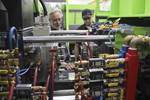

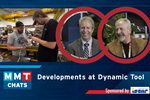











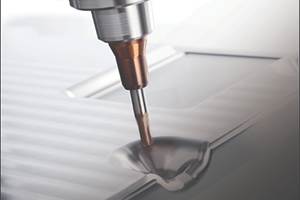
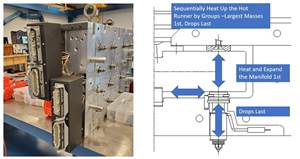
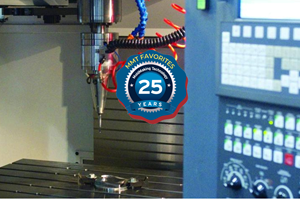
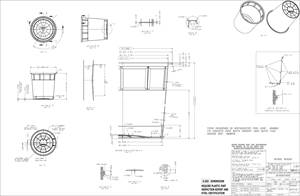
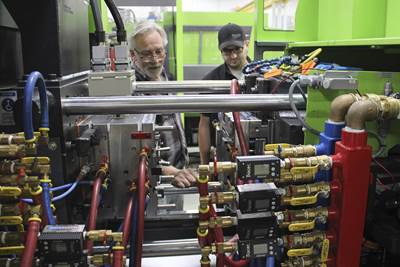

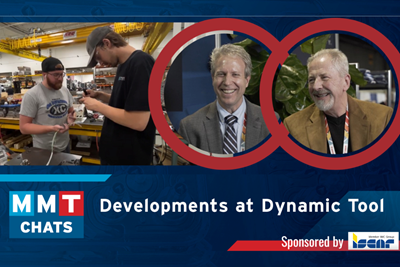
.jpg;maxWidth=970;quality=90)